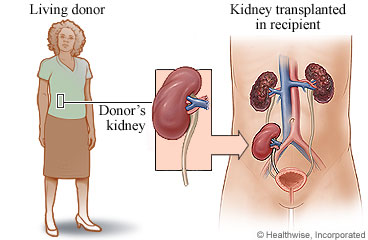
What is a living organ donor?
You may be thinking about donating an organ to a family member or friend. Or you may want to donate an organ to help someone in need. Donating an organ while you're alive is called a "living donation."
Some people who are critically ill need an organ transplant to live. But there are a lot more organs needed than are available. One problem is trying to match a donated organ with the body of the person who gets the organ.
Make sure to think about how giving an organ may affect your emotions. If you're thinking about being an organ donor, you will be asked if you understand how it may affect you and your family. You will also be asked if you understand how it may affect your health. And you will be asked if you feel pressured to donate an organ.
For many people, making a living organ donation can be rewarding. After a successful transplant, most donors feel a special sense of well-being because they may have helped save a life.
What to know
- Most adults can become organ donors.
- You can donate to someone you know. Or you can donate to your provincial organ donor organization.
- Organs you can donate include a kidney or part of the liver, lung, pancreas, or intestines.
- You need a number of medical tests before you can donate.
- You don't pay for your medical costs.
- If you have questions about organ donation, talk to your doctor, a trusted friend, or your faith leader.
- Most religions allow organ donation.
If you're interested in donating organs or tissues, or if you want to learn more, go to the Canadian Blood Services Organs and Tissues for Life web page (organtissuedonation.ca).
What organs can you donate?
Living donors can donate these organs:
- A kidney
- A lobe (part) of a lung
- A lobe of your liver (It will grow back to almost its original size in your body and in the recipient's body over time.)
- A section of your intestine
- A part of your pancreas
You can also donate bone marrow, umbilical cord blood, and peripheral blood stem cells.
Can anyone be a living organ donor?
- You don't have to be in perfect health to donate an organ, as long as the organ you donate is healthy.
- Adults can sign up to be living organ donors.
- To be a living donor, you must be:
- In good general health.
- Free from diseases that can damage the organs. These include diabetes, uncontrolled high blood pressure, and cancer.
- If you are or may someday become pregnant, talk with your doctor. Donating an organ could affect your future pregnancies.
Who can you donate to?
You can donate to someone you know. This can include a family member, a friend, a co-worker, or a person who you know needs an organ. Or you can donate to someone in need by donating to your provincial organ donor organization.
What are the risks?
Living organ donation has risks for both the donor and the person who gets the organ. It's major surgery to take out an organ or a part of an organ. There is always the risk of problems from surgery, such as pain, infection, pneumonia, bleeding, and even death. After the surgery, you may face changes in your body from having one of your organs removed.
What are the costs?
Your costs for the transplant surgery will be paid for by your own provincial health plan or the plan of the person who gets the organ. You may get help with some of your travel expenses. But also think of your costs in terms of lost wages, child care, and possible health problems in the future.
While it is very unlikely, your own private insurance costs may rise after the surgery. And later you might have problems getting or keeping private health, life, or disability insurance. Check with your private insurance provider to find out how your donation may affect your coverage.
Where can you learn more?
Go to https://www.healthwise.net/patientEd
Enter O498 in the search box to learn more about "Learning About Living Organ Donation".
